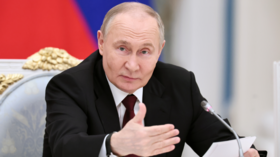ROAR: Medvedev discusses “painful problems” with human rights activists

Representatives of civil society hope their meeting with the president will be as effective as the previous one.
Dmitry Medvedev on November 23 met with members of the presidential Council for Civil Society Institutions and Human Rights for the second time during the year. The council is comprised of 36 representatives of public organizations.
The president said that following the results of the first meeting held in April, the amendments that simplify the registration procedures had been submitted to the law on NGOs. Also, the government’s commission on migration policy was formed.
This time, one of the main topics discussed at the meeting was state support for non-commercial organizations. In his address to parliament on November 12, Medvedev promised introducing the institution of “non-profit organizations with a social focus.”
At the meeting, he said he had submitted to the State Duma a draft law that allows such organizations to receive support from the state, “including in the form of duty and tax breaks, preferences for state and municipal procurement.”
“We will continue our efforts in this area and will further support the non-commercial philanthropic organizations that help in solving various problems, including social problems,” Medvedev said.
Yaroslav Kuzminov, rector of the Higher School of Economics, said that the work on amendments to the legislation on non-commercial organizations may be finished by summer 2010. At the first stage, after the meeting with the president in April, amendments have been submitted to the basic law on non-commercial organizations, he was quoted by Actualcomment.ru as saying.
The renewed law has really made the procedure of registration and accounting simpler, he said. The changes concern almost 80% of non-commercial organizations, he added.
The second stage should be realized during the next several months. “It is an economic bloc of the legislation that facilitates charity activities and economic activities of non-commercial organizations, including social advertising,” Kuzminov said.
The third stage concerns the codification of non-commercial organizations, because now some of them are involved in business activities, he said.
Another main problem that was discussed at the meeting was fighting corruption and reforming law enforcement agencies. Human rights activists stressed the need “to reform the Interior Ministry and the judicial system,” Vremya Novostey daily said. They also said that the fight against corruption should not be a short-term campaign, the paper added.
Ella Pamfilova, Chair of the Presidential Council on Civil Society Institutions and Human Rights, said the police system should be modernized. The media say that in this regard, she mentioned the cases of Police Major Aleksey Dymovsky who posted videos on Internet against his bosses and Sergey Magnitsky, a lawyer for Hermitage Capital Management investment fund, who died in prison before being put to trial because he had been allegedly denied proper medical care.
The law enforcement system should be first “reorganized” before it will be strengthened; Vremya Novostey quoted Pamfilova as saying.
Pamfilova also said that the Council on Civil Society Institutions and Human Rights may contribute to the fight against corruption. However, the problem is, she added, “who and how will fulfill it.”
The president answered that “neither the United States, nor France” would help to fight corruption in Russia, and the problem should be only solved by “officials and representatives of civil society.”
“I think that the steps we have taken already at least send a serious signal that this is the direction in which our society should develop and the road for improving our political system,” Medvedev added.
Yelena Panfilova, director of Transparency International Russia told the Agency of Social Information: “It is not a secret that officials do not welcome the participation of the institutions of civil society in supervising their activities.”
“There is a bureaucratic sabotage of anticorruption reforms,” she said. Among officials there are few people “who actually support measures to fight corruption,” she added. Addressing the meeting, she said that the anti-corruption plan is being fulfilled in Russia, “but it does not affect the level of corruption much.”
Panfilova explained this situation by the fact that “a huge field of officials” exists in the anticorruption course set by the president and civil society and does not want to do anything in that direction. According to Panfilova, the president agreed that “there is a problem and it is really serious and very painful.”
Kirill Kabanov, head of the National Anti-Corruption Committee, a public organization, told Gazeta.ru website that the work with citizens’ appeals was discussed at the meeting. It is necessary to ban the very same officials, about which people complain, to answer them, he said.
“It is also necessary to invite experts to the presidential council on fighting corruption to strengthen it,” Kabanov said.
The next time the Council on Civil Society Institutions and Human Rights will gather is in spring 2010, Gazeta.ru said. Pamfilova suggested it should be dedicated to the situation in the North Caucasus, where “human rights activists and public figures are killed.”
Pamfilova added that activists of civil society are forced to leave the North Caucasus “if they do not obey local officials.” Medvedev agreed to hold such a meeting with the participation of human rights activists working in the region.
Human rights activists hope that their second meeting with the president will bring results like the first one. Aleksandr Brod, director of the Moscow bureau on human rights and member of the Public Chamber was quoted by Actualcomment.ru as saying that “during the financial and economic crisis… human rights organizations are needed more than ever.”
“I think that now the efforts of non-commercial and non-governmental sector in particular are highly sought,” he said.
Sergey Borisov, RT












